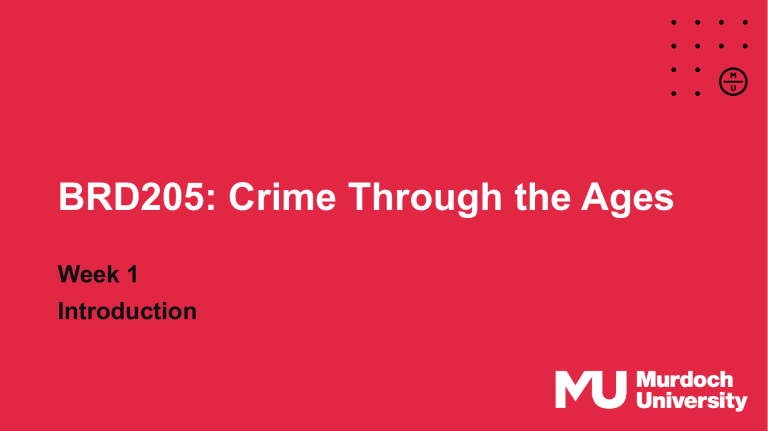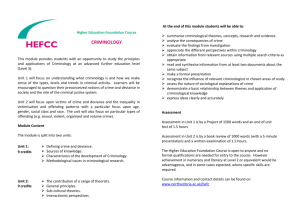
BRD205: Crime Through the Ages
Week 1
Introduction
Disciplinary and Interdisciplinary
The problem of deviance can only be solved by an
interdisciplinary response to deviance
“In its modern form, Criminology has had over one
hundred years to assume a truly interdisciplinary
nature, yet the dominant approach remains disciplinebased.”
Binder, 1988
“The
general rejection by sociologists of contributions
from other fields seems based not only on normal
disciplinary chauvinism, but also on a strongly held
normative view that social conditions are more
responsible for crime than innate individual
differences.”
Binder, 1988
What disciplines are interested in deviance?
•
•
•
•
•
•
•
•
•
•
Sociology
Psychology
Law
Political science
Economics
Medicine
Genetics
Nutrition
Anthropology
History
“While I was still a graduate student [with sociology as
the major field], I asked myself how it was possible to
have three giants such as Sutherland [sociology], Hall
[law], and Skinner [psychology] within 100 yards of
each other [at Indiana University] without any
significant mutual interaction. They might as well have
been on different planets, so far as graduate education
in criminology was concerned at Indiana.”
- Jeffery, 1978
• All theoretical perspectives in most areas of study, emerge and develop within
particular contexts:
• Social
• Economic
• Political
• This results in particular assumptions, understandings and agendas
Classical Criminology
The rational perspective
Assumptions
• Individuals were essentially selfish, self-seeking and rational
• Individuals sought to maximise their pleasure, while minimising their pain
“I am apt to suspect the Negroes, and in
general all the other species of men… to
be naturally inferior to the whites.”
- Hume
• The vast amount of Enlightenment literature refers to ‘men’
• Which equates to White Males who owned property
Cesare Beccaria (1738 – 1794)
• Member of the radical group known as the
“Academy of Fists”
• Fellow members Pietro and Alessandro Verri
(brothers) encouraged Beccaria to write an essay
on penology
• Pietro wrote a history of torture, Alessandro was a
prison official
• Beccaria knew nothing of Penology, but he was
heavily influenced by what he saw as arbitrary and
unjust punishments, and a lack of judicial process
Arbitrary Punishment
• Three categories of offences:
• minor offences,
• clergyable felonies, and
• non-clergyable felonies
• By the 18th century the definition of clergy had been broadened to
include anyone who could read
Lack of due process
• After the charge was read, each prisoner was
asked to plead to the charge – guilty or not guilty
• A defendant who refused to plead was subjected
to the ordeal of peine forte et dure
Beccaria’s Radical Ideas
• Called for:
• Introduction of public trials
• End of torture
• End of capital punishment
The intent of punishment is not to torment a sensible
being, nor to undo a crime already committed. The end
of punishment, therefore, is no other than to prevent
the criminal from doing further injury to society, and to
prevent others from committing the like offence.”
- Beccaria
Jeremy Bentham (1748-1832)
• Utilitarian Liberalism
• Hedonic Calculus
Propinquity
{N[C(I*D)]+Ny[Cy(Iy*Dy)]}
Certainty
Magnitude
of Pleasure
Positivist Criminology
The determinism perspective
Positivism
• Deviance too, could be objectively and scientifically studied
• Three forms of positivist criminology
• Biological
• Psychological
• Sociological
• Assumption: Deviant behaviour is more or less caused by determining
factors beyond the individual’s control
Cesare Lombroso (1835-1909)
•
•
•
•
•
•
Born to a Jewish family in Northern Italy
Medical Doctor
Fought during the unification movement in Italy
Director of several asylums
Chair of Legal Medicine and Public Hygiene – University of Turin
Developed an interest in spirituality late in life
Atavistic Characteristics
•
•
•
•
•
•
•
Smaller skulls with marked deformities
Physically taller and heavier
Darker skin, eyes and hair
Large ears
Protruding jaws
Impaired muscular strength
Lower sensitivity to pain (physical and emotional)
Critical Criminology
The radical perspective
Critical Criminology
• Radical tradition originating in the late 1960s/early 1970s
• Originally, U.S. – non-Marxist conflict; Britian – Marxist conflict
• Seek to analyse crime and deviance within the economic and political context of
capitalism
Karl Marx
• Actually wrote very little about crime!
• Father of social theory
• Methodology (following Hegel)
• Abstraction
• Social Conflict
Law
• Used by the most powerful to protect their own interests by criminalising the least
powerful
• Calls into question the notion of ‘crime’
Thank you
Next week:
Workshop 1 (International law, racism, & social division).
Complete the lecture and pre-activities before the workshop.

